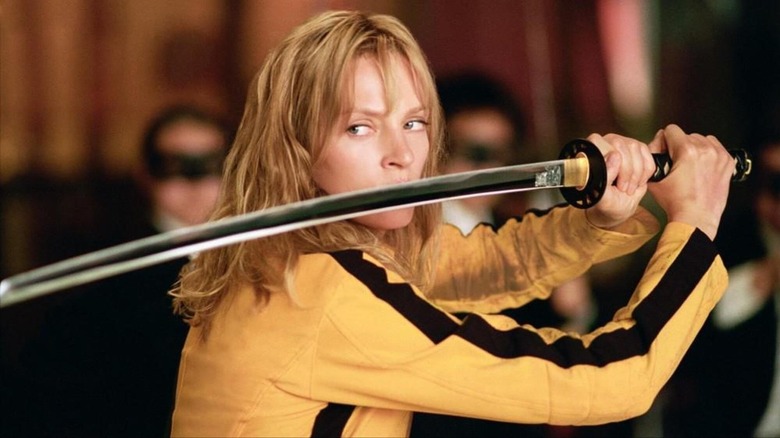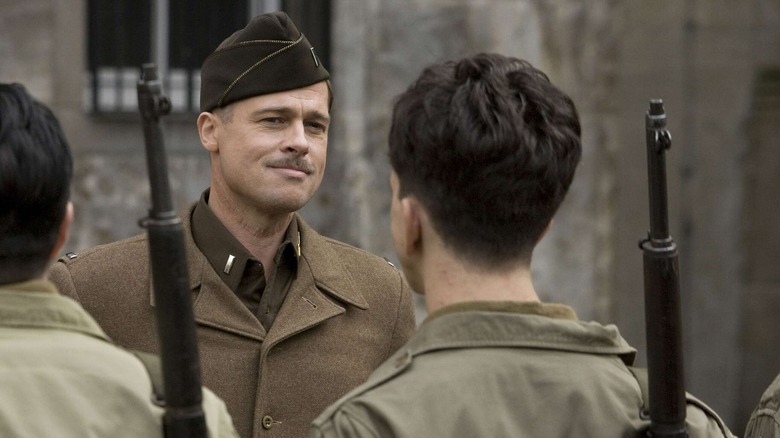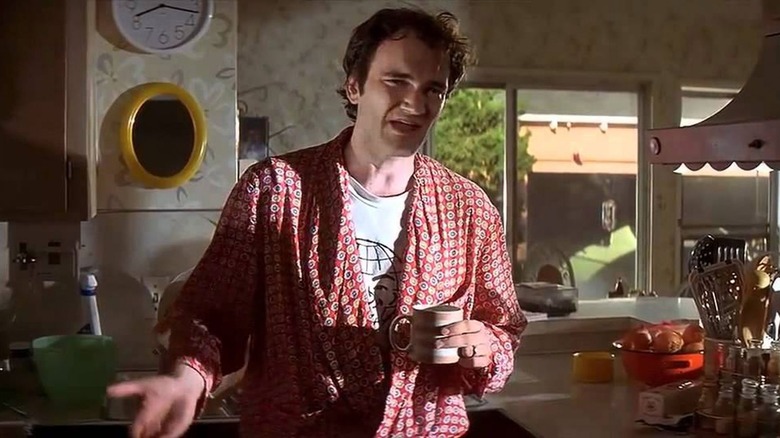Why Quentin Tarantino Thinks A Miniseries Would Be A Good Fit For His Scriptwriting Style
Every time a movie comes out these days with a runtime close to (or even going past) the three-hour mark, it's common for people to wonder, "Couldn't this have been a TV show instead?" You'll often hear "Dune" fans wonder if perhaps the first book would've benefitted from being adapted into a 10-hour season of TV at some streamer like HBO, instead of being two movies released two years apart. After all, even when splitting the book in two, Director Denis Villeneuve was still forced to cut out a ton of the political maneuvering that makes the book so interesting.
Well, it turns out Quentin Tarantino has had similar thoughts, although it's the miniseries format specifically that grabbed his attention. Speaking at a directors roundtable in 2012, he talked about the difficulties that come with writing movies so ambitious that their run times test moviegoers' patience. His most recent movie at the time, "Django Unchained," was originally over three hours, and he was pressured by the studio to cut it down to a (still very long) 2 hours and 45 minutes.
Tarantino held no ill will over this — "I didn't want a three-hour movie either," he said — but there's something frustrating about being forced to cut things down. "The one movie that I was actually able to use everything — where you actually have the entire breadth of what I spent a year writing — was the two 'Kill Bill' movies," he explained. "Because it's two movies."
Years later, he'd also get to use most of his material for an extended version of "The Hateful Eight" on Netflix, although Tarantino didn't believe the longer version was necessarily superior. He described the Netflix cut as being perfect for viewers who already liked the original movie and wanted more of it.
The benefits of a miniseries
Some of the most critically-acclaimed shows of our time are miniseries, and it's easy to see the appeal: they offer the complex characterization that TV can be so much better than films at providing, but with the same promise of a satisfying resolution sooner rather than later. Viewers get a break between episodes so they won't have to pause at any point to use the bathroom, and they know they won't have to wait a year or two (if ever) for any sort of cliffhanger to be resolved.
It's easy to look at Tarantino's films and imagine the formats changed a little differently. "Inglourious Basterds" in particular feels like it could've easily been a miniseries if Tarantino had wanted to go down that route, with its many converging storylines and massive cast of characters. The story of how Shosanna (Mélanie Laurent) survived in the aftermath of her family's death, which was cut from the movie, could've been an episode on its own.
It helps that Tarantino already uses an episodic format, often splitting his movies into "chapters" as if he's writing a novel. He's described his scripts as "not novels, but they're novels written with script format." And although books get turned into movies all the time, shows like "Game of Thrones," "Station Eleven," and "The Queen's Gambit" have proven that TV is often the best medium for adapting novels, not film. Movies may be better suited for adapting short stories and novellas, as films like "Arrival" and "The Mist" have made clear.
Tarantino's current plans
"So if I'm gonna do TV in public, I'd rather just write one of my big scripts and do it as a miniseries for HBO, and then I don't have the time pressure that I'm always under, and I get to actually use all the script," Tarantino explained back in 2012. "If I'm gonna do another big epic thing again, it'll probably be like a six-hour miniseries or something."
So, it wasn't a huge shock last year when he announced he'd be making an eight-episode miniseries. What will it be about? We don't know yet. As of November 2022 he had plans to start filming sometime this year, so it likely won't air at least early 2024. All we really know is that Tarantino must've had a good experience adapting "The Hateful Eight" into a miniseries, because now, for the first time, a project of his will be intended as a miniseries from the start.
Perhaps the biggest upside to all this is that Tarantino seems to have found a loophole in his famous promise that he would only do 10 movies in his whole career. It's a promise that's concerned fans, as it would mean his next film would be his last. That's why this news is so exciting to Tarantino fans: not only does a miniseries mean he's got more freedom with his material, but it means his creative career might not be ending so soon after all.


